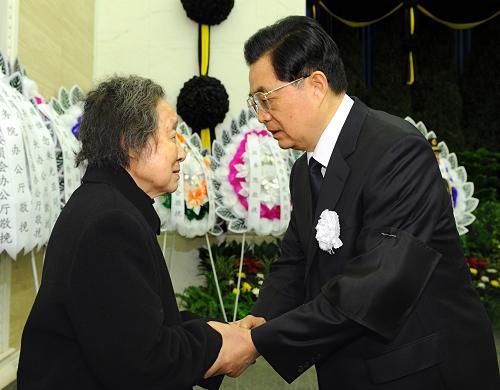(From Xinhua, 2011-03-02)

Chinese President Hu Jintao (R) shakes hands with a relative of Zhu Guangya, a renowned nuclear physicist and one of the key scientists engaged in the development of China's atom and hydrogen bombs, during the funeral of Zhu Guangya in Beijing, capital of China, March 2, 2011. Hu Jintao, Wu Bangguo, Wen Jiabao, Jia Qinglin, Li Changchun, Xi Jinping, Li Keqiang, He Guoqiang and Zhou Yongkang attended Zhu's funeral in Beijing along with many other people
BEIJING - The funeral of Zhu Guangya, a renowned nuclear physicist and one of the key scientists engaged in the development of China's atom and hydrogen bombs, was held in Beijing Wednesday.
Zhu died of illness in Beijing on February 26 at the age of 87. His body was cremated at Beijing's Babaoshan Revolutionary Cemetery Wednesday.
President Hu Jintao, top legislator Wu Bangguo, Premier Wen Jiabao, top political advisor Jia Qinglin and other senior leaders, including Li Changchun, Xi Jinping, Li Keqiang, He Guoqiang and Zhou Yongkang, and many other people, bid a final farewell to Zhu at the ceremony.
A statement issued by the General Office of the Communist Party of China (CPC) Central Committee Wednesday hailed Zhu as "an outstanding CPC member, loyal Communist fighter, outstanding scientist and one of the major pioneers in China's development of nuclear science."
Zhu was a senior academician of both the Chinese Academy of Sciences and the Chinese Academy of Engineering.
He served as vice chairman of the National Committee of the Chinese People's Political Consultative Conference, China's top political advisory body, from 1994 to 2003.
Born in Yichang, in central China's Hubei province, in 1924, Zhu obtained a PhD in nuclear physics from the University of Michigan in 1950, and returned to China the same year. He joined the CPC in 1956.
Together with other noted scientists, Zhu led the development of China's first atom and hydrogen bombs as well as its first underground nuclear tests from 1964 to 1969, making important contributions to the technological breakthroughs.
He also participated in the development of the Qinshan Nuclear Power Plant, research on the application and development of the radioactive isotope, and the drafting and implementation of China's high-tech research and development programs.
Related News
Photos
More>>trade
market
finance
- International Calorimetry and Thermal Analysis Symposium Opened in Dalian
- 23rd International Symposium on Molecular Beam(ISMB) Opened in Dalian
- 2nd Annual Meeting of Chinese-French Joint Laboratory for Sustainable Energy
- Visit of Prof. Tkatchenko at DICP
- Lectures by Scholars of Queen's University Belfast at DICP





